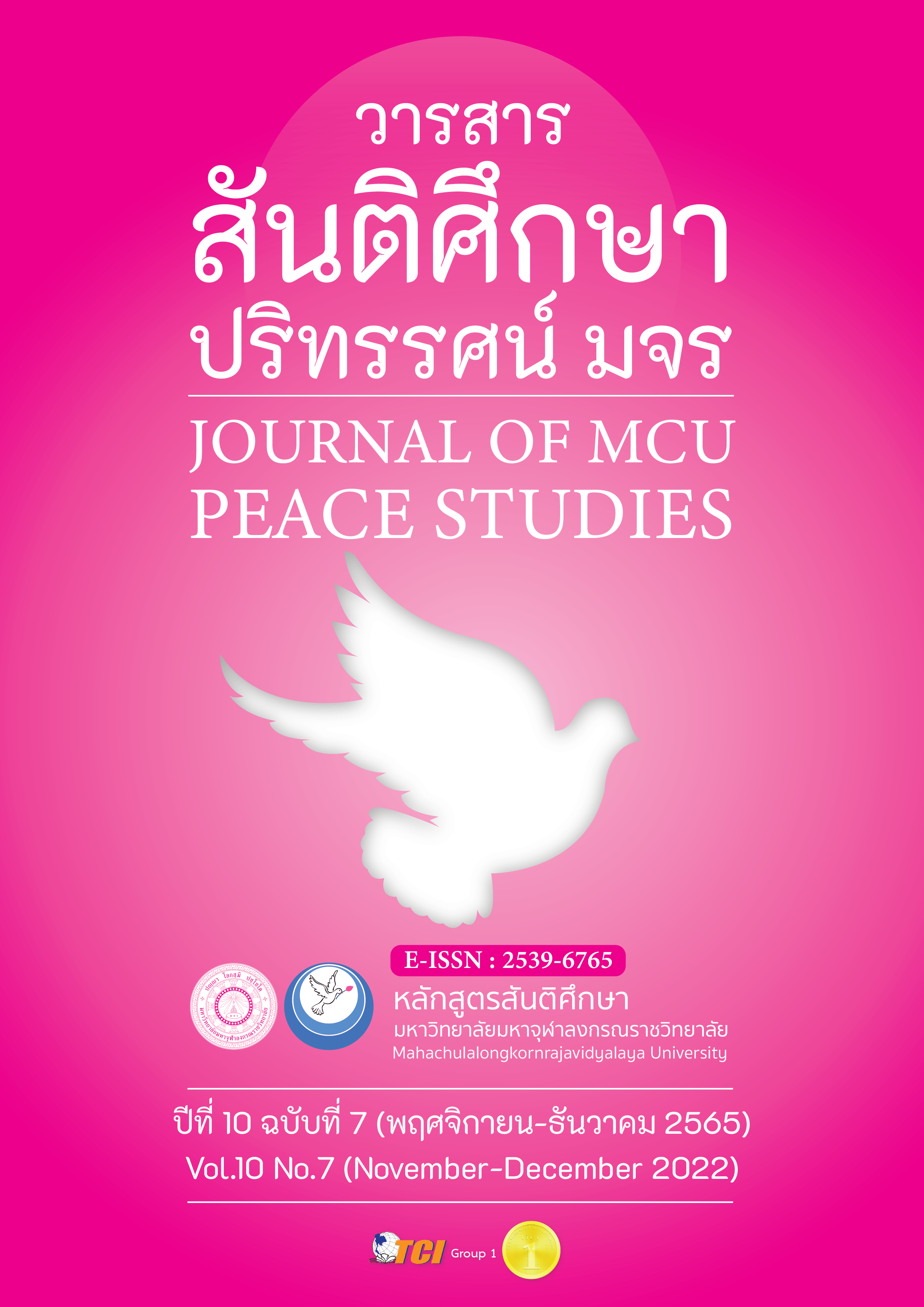ผลการจัดการเรียนรู้โดยประยุกต์ใช้แนวคิดจิตตปัญญาบูรณาการร่วมกับการเรียนรู้โดยใช้ปัญหาเป็นหลักที่มีต่อการเปลี่ยนแปลงในตนเอง: กรณีศึกษาการจัดการเรียนรู้ในรายวิชาจริยศาสตร์และกฎหมายวิชาชีพทางการพยาบาล
Main Article Content
บทคัดย่อ
การวิจัยครั้งนี้ มีวัตถุประสงค์เพื่อศึกษาการเปลี่ยนแปลงในตนเอง ก่อนและหลังการจัดการเรียนรู้โดยประยุกต์ใช้แนวคิดจิตตปัญญาบูรณาการร่วมกับการเรียนรู้โดยใช้ปัญหาเป็นหลัก กลุ่มตัวอย่างคือ นักศึกษาพยาบาลชั้นปีที่ 2 จำนวน 11 คน ซึ่งได้มาจากการสุ่มแบบกลุ่ม เครื่องมือที่ใช้ในการวิจัย ประกอบด้วย
1. แผนการสอนการจัดการเรียนรู้โดยประยุกต์ใช้แนวคิดจิตตปัญญาบูรณาการร่วมกับการเรียนรู้โดยใช้ปัญหาเป็นหลัก 2. แบบบันทึกการสะท้อนคิด วิเคราะห์ข้อมูลโดยการวิเคราะห์เนื้อหา
ผลการวิจัย พบว่า นักศึกษาพยาบาลมีการเปลี่ยนแปลงในตนเอง หลังการจัดการเรียนรู้ จำแนกได้ 3 ประเด็น ดังนี้ 1. การเปลี่ยนแปลงระดับบุคคล ด้านความรู้และความเข้าใจในเนื้อหาของบทเรียนที่เพิ่มมากขึ้น ด้านอื่นๆประกอบด้วย 1.1 ด้านทักษะการสื่อสาร ทั้งด้านการพูด การฟัง การอ่าน 1.2 ด้านทักษะการกล้าคิดกล้าแสดงออก และ 1.3 ทักษะการยอมรับฟังความคิดเห็นของคนอื่น 2. การเปลี่ยนแปลงระดับกลุ่ม โดยพบการเปลี่ยนแปลงในทักษะการทำงานเป็นทีมที่ดีขึ้นและการเข้าใจความแตกต่างระหว่างบุคคลที่เพิ่มมากขึ้น และ 3. การเชื่อมโยงความรู้สู่การปฏิบัติ พบว่านักศึกษาพยาบาลตระหนักถึงความสำคัญของวิชาชีพพยาบาลในการให้บริการแก่ผู้รับบริการในประเด็นปัญหาทางจริยธรรม ที่ชัดเจนและเป็นรูปธรรมเพิ่มขึ้น
Article Details

อนุญาตภายใต้เงื่อนไข Creative Commons Attribution-NonCommercial-NoDerivatives 4.0 International License.
ทัศนะและความคิดเห็นที่ปรากฏในบทความในวารสาร ถือเป็นความรับผิดชอบของผู้เขียนบทความนั้น และไม่ถือเป็นทัศนะและความรับผิดชอบของกองบรรณาธิการ ยินยอมว่าบทความเป็นลิขสิทธิ์ของวารสาร
เอกสารอ้างอิง
Boonpleng, W. et al. (2016). A Effects of Problem-Based Learning on Course Achievement among Baccalaureate Nursing Students. Nursing Science Journal of Thailand, 36(4), 28-38.
Chiddee, K., Siriphan, S. & Kaeomaungfang, R. (2019). Contemplative Education: Learning Management in Health Promotion and Illness Prevention Practicum. Princess of Naradhiwas University Journal, 10(3), 231-241.
Choosang, S. (2019). The Paradigm of Contemplative Education Enhance Humanized Care of Nursing Student. (Doctoral Dissertation). Silpakorn University.
Dhabdhimsri, V., & Naiyapatana, O. (2017). Enchanting Thinking Process Skills in Adult Nursing Using Problem-Based Learning. Journal of Boromarajonani College of Nursing, Bangkok, 33(1), 104-114.
Fry, S. T., & Johnstone, M. J. (2002). Ethics in Nursing Practice. (2nd ed.). Melbourne: Blackwell Science Ltd.
Hart, T. (2004). Opening the Contemplative Mind in the Classroom. Journal of Transformative Education, 2(1), 28-46.
Jantaveemuang, V., Balthip, K., & Petchruschatachart, U. (2018). Effect of Contemplative Education Program on Spiritual Well-Being of Nursing Students. Journal of Nursing, Siam University, 19(37), 84-102.
Johnson, L. J., & LaMontagne, M. J. (1993). Research Methods Using Content Analysis to Examine the Verbal or Written Communication of Stakeholders within Early Intervention. Journal of Early Intervention, 17(1), 73-79.
Pakdeto, R., & Arpaichiraratana, C. (2016). An Application of Transformative Learning in Arranging Learning Experience Regarding Ethical Decision Making for Nursing Students. Thai Red Cross Nursing Journal, 9(1), 1-10.
Panyaprouks, S. (2021). Development of 21st Century Skills (4C’s) Based on Contemplative Education, Coaching & Mentoring System and Research-based Learning (CCR) for Teacher Students. Silpakorn Education Research Journal, 13(1), 371-388.
Polsingchan, S., & Rungruang, K. (2020). The Integration of Contemplative Education Concepts and Problem-Based Learning Method in a Selected Topic of Ethics and Laws in Nursing Profession Subject for Nursing Students. Nursing Journal of the Ministry of Public Health, 30(2), 23-35.
Poolpatarachewin, C. (2008). Contemplative Education About the Dawn of a New Consciousness in Education in Contemplative Education for Human Development. A Collection of Articles for the Academic Conference of the Year 2008. (p. 354-380). Bangkok: Contemplative Education Center, Mahidol University.
Praboromarajchanok Institute. (2018). A Guide to the Implementation of the Identity of the Graduates of Praboromarajchanok Institute, Office of the Permanent Secretary, Ministry of Public Health. Nonthaburi: Yuttarin Printing.
Pusiripinyo, V. (2018). Developing a Teaching Model Integrated the Concepts of Contemplative Education, Research-Based Learning, and Coaching for Preparing Student Teachers, Majoring in English to Community. Academic Journal of Buriram Rajabhat University, 10(2), 97-122.
Puttiwanit, N., Puttiwanit, S, Suwanraj, M., & Kaewmahakam, O. (2017). Effect of Problem-Based Learning on Intellectual Skills of Nursing Student in Nursing of Persons with Health Problems I Subject. The Southern College Network Journal of Nursing and Public Health, 4(1), 1-14.
Saentree, K., Klangpraphan, M., & Thonglao, P. (2014). The Effects of Psycho-Intellectual Activities in Conjunction with the Problem-Based Learning Affecting Stratification, Problem Solving Abilities and Self-Confidence of The Preschool Children. Graduate Studies Journal, 11 (52), 45-53.
Satyophas, S., & Samaket, N. (2013). Using the Process of Contemplative Studies in General Education Program to Develop Morals, Ethics, and Desirable Values for Undergraduate Students of Chiang Mai Rajabhat University. Ganesha Journal, 9(1), 1-9.
Sophonsuwapap, P. (2019). Theatre for Learning to Inner Self Transformation. Music and Performing Arts Journal, 5(2), 106-122.
Thayati, S. (2020). The Development of Organizing Learning Activity in Methods of Teaching English Course by Integrating Contemplative Education. Ganesha Journal, 16(1), 55-68.
Tongmuangtunyatep, K. et al. (2019). Effects of the Contemplative Education Process on Knowledge About Family Planning among Students in the Secondary Educational Service Area Office in Region 5, Chai Nat Province. The Southern College Network Journal of Nursing and Public Health, 5(3), 43-52.


